Key takeaways:
- Anti-war activism aims to promote peace and human rights, criticizing the glorification of war while highlighting its long-lasting consequences on communities.
- Policy changes can redirect resources from military spending to social programs, fostering dialogue and community well-being.
- Storytelling and coalition-building are effective strategies for activism, amplifying voices and creating connections that inspire collective action.
- Engaging with policymakers through personal narratives fosters understanding and can significantly influence legislative decisions.
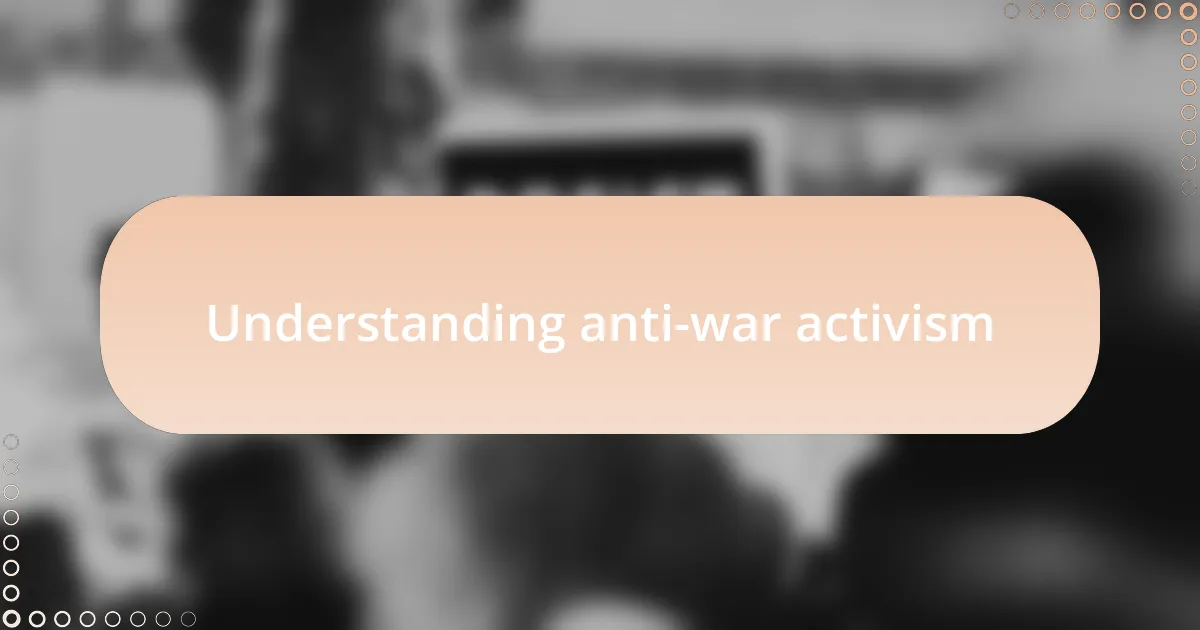
Understanding anti-war activism
Anti-war activism is rooted in the belief that war often leads to profound human suffering, which I have witnessed firsthand during my involvement in various movements. I remember attending my first rally, feeling the palpable energy and shared conviction among the crowd. It struck me then: how could we sit silently when lives were at stake?
At its core, anti-war activism not only opposes military action but also promotes peace, diplomacy, and the protection of human rights. I vividly recall speaking to a veteran who had returned from combat. His stories of loss and despair reinforced my understanding that the consequences of war extend far beyond the battlefield, affecting families and communities for generations.
Engaging with this movement can be both transformative and daunting. Have you ever found yourself questioning the justifications for military intervention? I often ponder the way our society glorifies war while glossing over the pain it inflicts on innocent lives. This critical examination is vital to fostering a culture of peace and understanding.
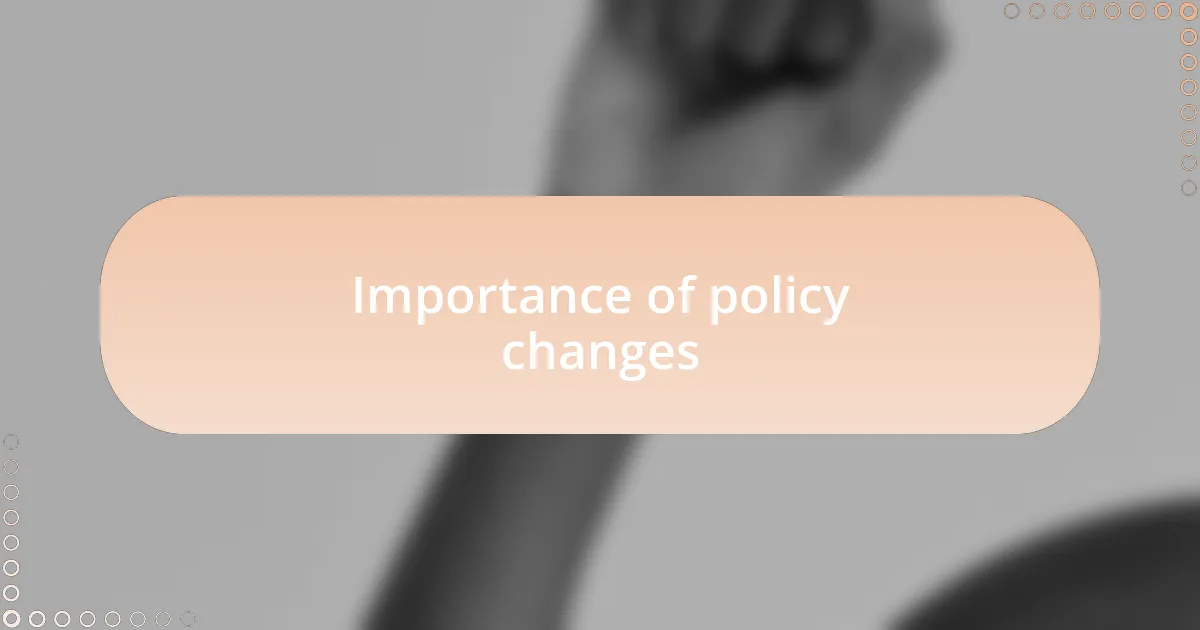
Importance of policy changes
Policy changes are crucial because they serve as the backbone for peace initiatives that can mitigate the impact of conflict on innocent lives. I recall participating in a local town hall meeting where citizens passionately voiced their concerns about military expenditures draining resources from education and healthcare. It struck me how a simple policy tweak could channel funds into programs that foster community well-being instead of fueling further conflict.
When policies shift, they can create a ripple effect that fosters dialogue and collaboration. I’ve seen firsthand how my advocacy efforts led to a city council vote to adopt conflict resolution training in schools. Isn’t it heartening to imagine children growing up learning to resolve disagreements peacefully rather than resorting to aggression? That small policy change could cultivate a generation more invested in diplomacy.
Moreover, policy changes can inspire a sense of accountability among leaders. I remember a poignant moment when I watched a legislator address the public following a significant vote against a military bill. Her recognition of the public’s voice was a reminder that our collective actions can lead to more responsible governance. How empowering it is to be part of a movement that influences decisions at this level, don’t you think? It reinforces the importance of staying engaged and demanding change from those in power.
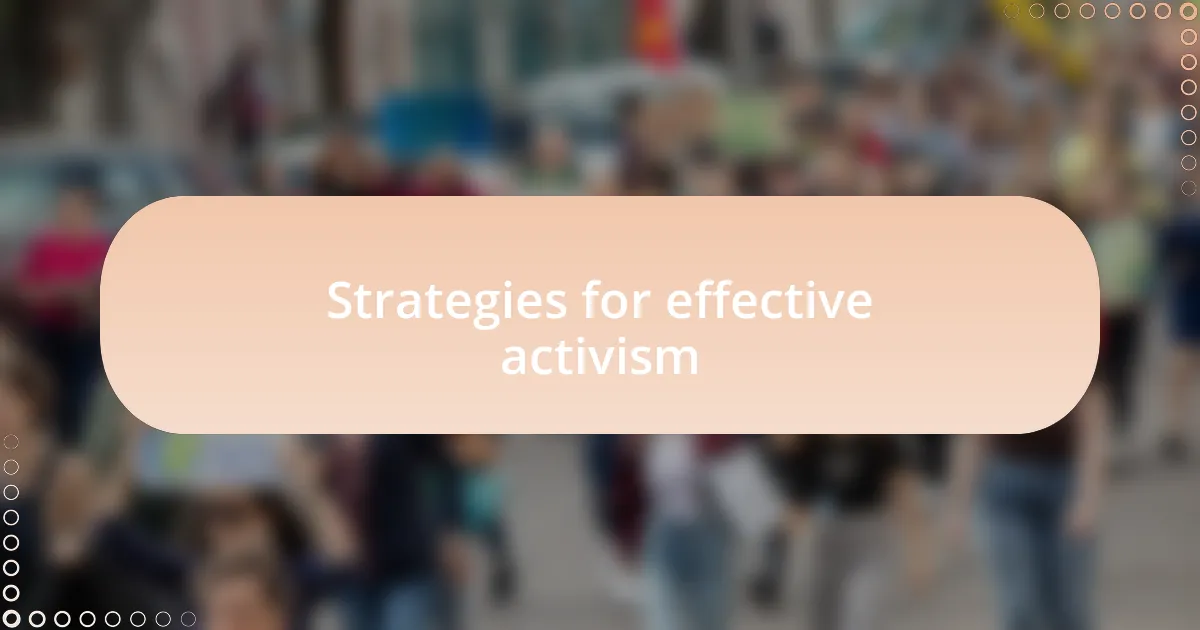
Strategies for effective activism
Activism thrives on a blend of strategy and creativity. I’ve learned that storytelling can be one of the most powerful tools in this toolkit. During a campaign against a military funding initiative, I shared a personal narrative about how war impacted my own family, discussing the emotional scars left behind. This personal touch not only resonated deeply with others but also humanized the statistics, transforming the abstract idea of policy into a relatable story that could inspire action.
Building coalitions is another effective strategy. I remember organizing a diverse group of activists, educators, and health professionals to advocate for conflict resolution policies. Each voice was unique, but our shared goal generated a wave of hope and determination. By uniting various stakeholders, we amplified our message and made it clear that anti-war activism is a universal concern. Have you ever experienced the power of collective action? There’s something electrifying about collaborating with others who share your passion.
Using social media to raise awareness and organize events has become essential in modern activism. I distinctly recall a successful online campaign that gathered thousands of signatures for a petition aimed at local government. The real-time engagement allowed us to quickly mobilize supporters, share updates, and keep the momentum alive. There’s a sense of urgency online that I find motivating. It feels like you’re part of something larger, doesn’t it? The immediacy of digital communication can transform how we connect and advocate for policy changes.
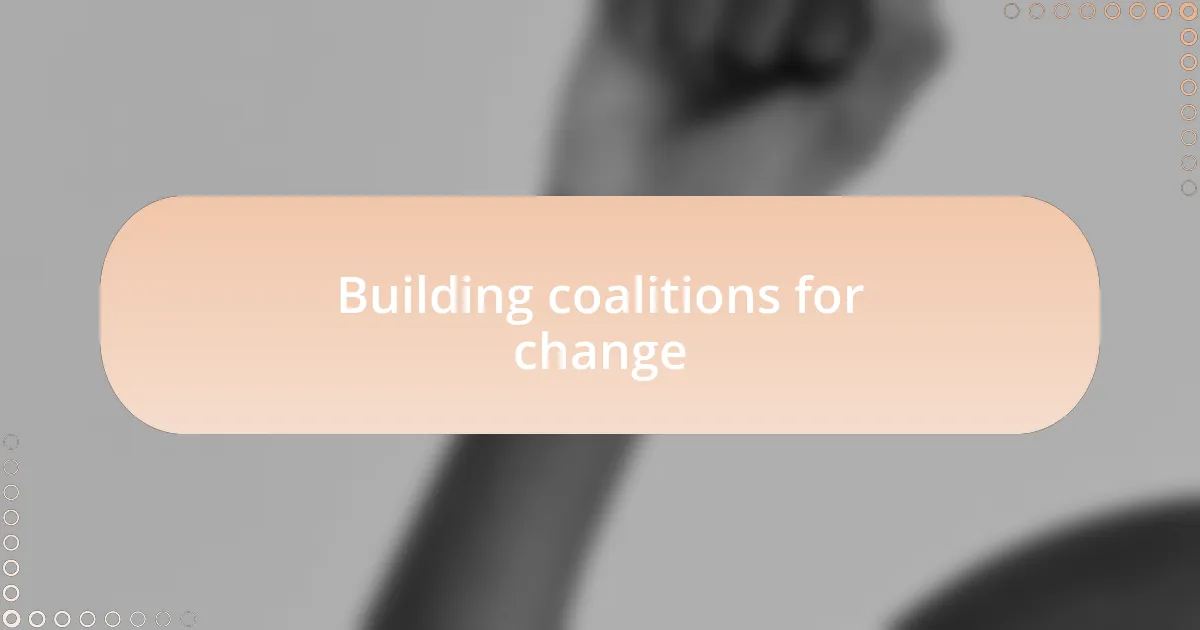
Building coalitions for change
As I dove deeper into anti-war activism, I realized the importance of building coalitions with diverse groups. For instance, during our campaign, we reached out not only to fellow activists but also to members of the faith community. That unexpected partnership added a spiritual dimension to our cause, amplifying our message and emphasizing the moral imperative to seek peace. Have you ever thought about how different perspectives can enrich a shared goal?
I vividly remember a particularly impactful meeting where local artists joined our ranks to express their anti-war sentiments through art. Their creativity brought a fresh energy to our coalition, weaving a tapestry of voices that resonated with the community. The collaboration sparked emotions that statistics alone couldn’t convey. It highlighted how coalitions can transcend traditional boundaries, inviting more people into the conversation.
Every time we gathered to strategize, I felt the potential for change in the air. The warmth of shared purpose was palpable, reminding me that the strength of our coalition lay not just in our numbers, but in our connections. By fostering these relationships, we cultivated a network that could support one another in ways I hadn’t anticipated. Have you ever experienced that kind of solidarity? It’s incredibly empowering and serves as a constant reminder that together, we can challenge the status quo.
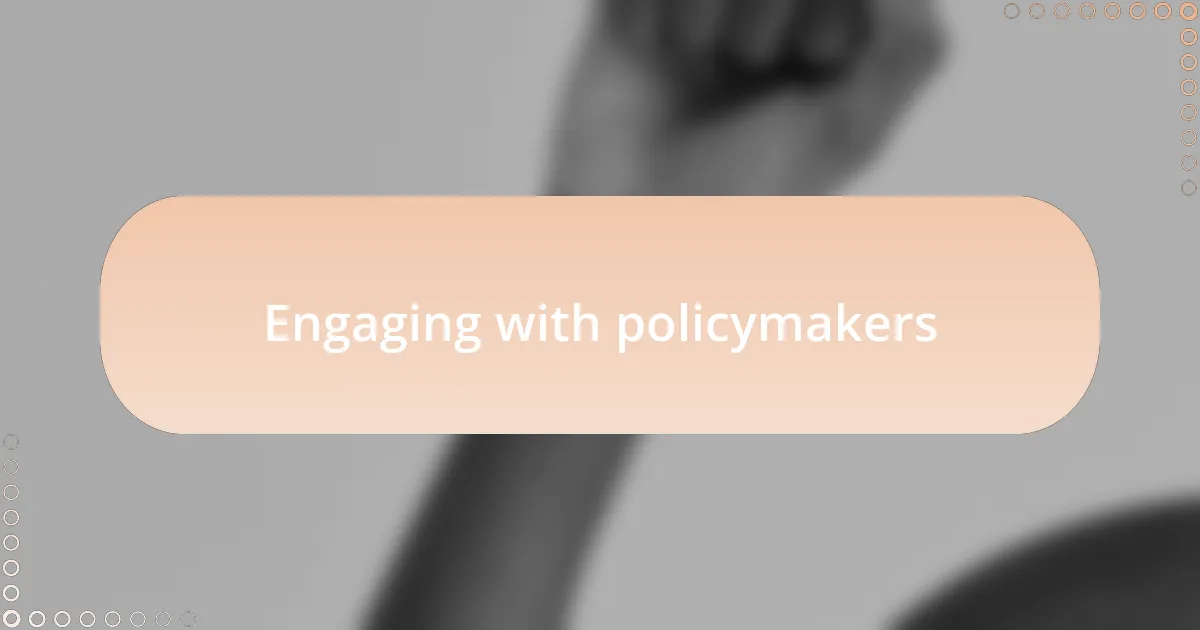
Engaging with policymakers
Engaging with policymakers requires a blend of persistence and strategy. I remember meticulously preparing for a meeting with a local representative who had been indifferent to our cause. It was nerve-wracking, but I chose to share a story about a family affected by war, which brought a human perspective to the sterile world of politics. Have you ever seen a bureaucrat’s eyes soften when confronted with a personal story? That’s the moment when policies can begin to shift.
In another instance, I organized a letter-writing campaign that rallied community members to pen their thoughts to decision-makers. The tangible power of our words was exhilarating; it felt like we were not just voicing our concerns, but forging a direct line of communication. Each letter encapsulated a different viewpoint, and together they painted a vivid picture of the public’s desire for change. Did you know that personal letters can sometimes have a greater impact than a thousand signatures on a petition?
As I participated in lobby days, I discovered the art of listening, which proved just as crucial as speaking out. Engaging with policymakers often means tuning into their concerns and finding common ground. I recall a moment when a policymaker expressed their fears about economic repercussions from anti-war legislation. By validating their concerns and suggesting solutions, I felt we moved closer to crafting policies that addressed both peace and economic stability. Isn’t it fascinating how dialogue can foster understanding, even amidst disagreement?
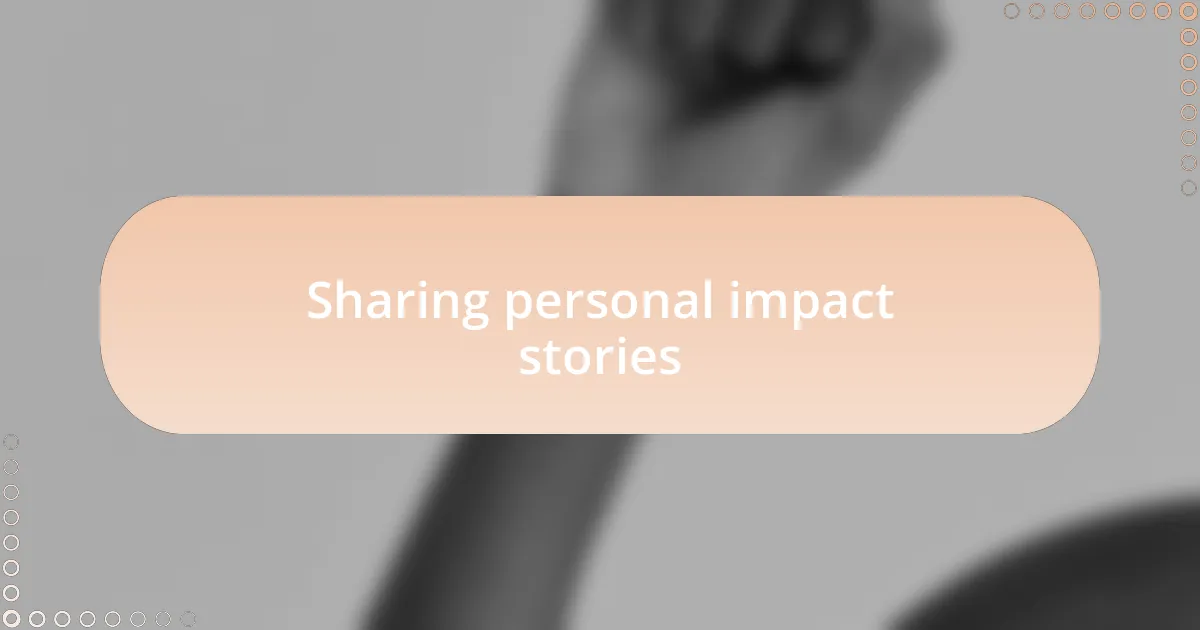
Sharing personal impact stories
Sharing our personal impact stories allows us to embody the very essence of our cause. One time, I shared my own journey at a rally, detailing how the sounds of war affected my childhood neighborhood. As I looked into the crowd, I could see tears in the eyes of many; it reminded me that everyone has a story, and these stories can spark a powerful wave of empathy. How can we expect change if we don’t humanize the statistics?
I remember listening to a fellow activist who recounted how her sibling returned from war but could never truly come back. The raw emotion in her voice as she described sleepless nights filled with anxiety was palpable. It struck me that such stories are fundamental; they remind policymakers that behind each statistic lies a human life. Isn’t it astounding how one person’s experience can resonate deeply with others, even those in positions of power?
One evening, I hosted a small gathering where people shared their stories, each one unique yet united in the fight against war. The atmosphere was electric with vulnerability and hope, creating connections that transcended our differences. It made me wonder—if we continue to share these narratives, could we cultivate a network of voices strong enough to shift the tide of public opinion? It’s a question worth pondering as we strive for meaningful change.
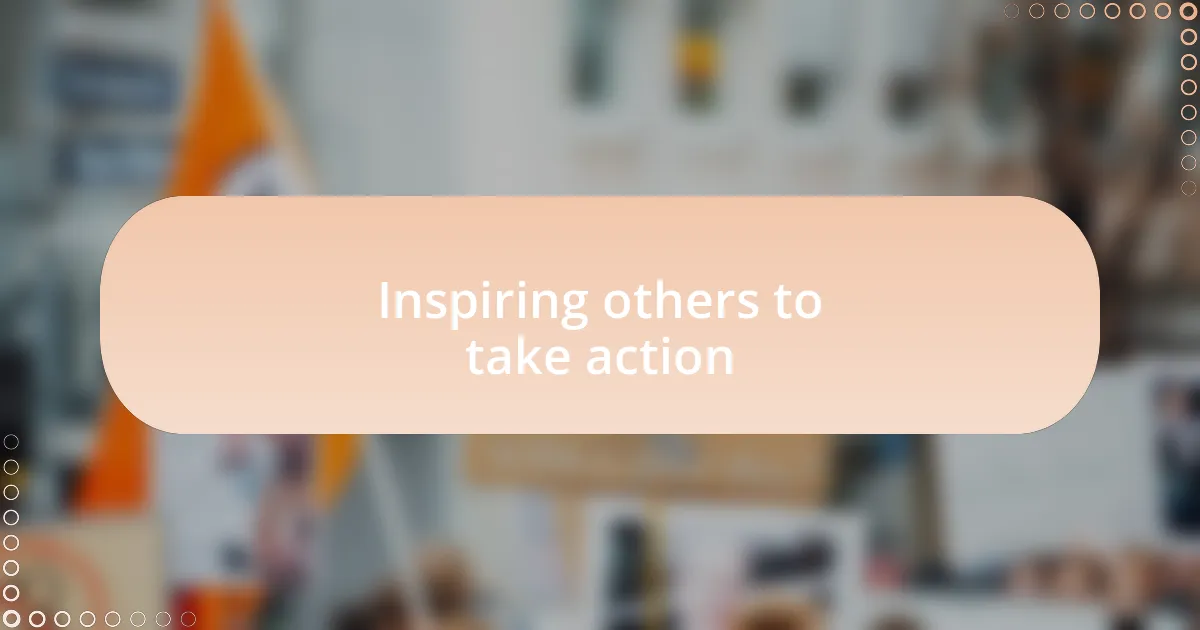
Inspiring others to take action
It’s remarkable how sharing our narratives can ignite a spark in others. I once led a workshop where attendees were encouraged to express their feelings about war and conflict. One participant, visibly shaken, shared how his brother’s deployment changed their family forever. The vulnerability he displayed was contagious; it moved others to open up and connect on a deeper level, fostering a sense of community that felt empowering. How powerful is it to realize that our stories can not only shine a light on individual experiences but also motivate others to take action?
Engaging people through storytelling can be a transformative experience. During a community event, I narrated a personal incident where I witnessed the devastating effects of war on innocent lives. Many in the audience nodded in agreement while others were visibly stirred. That moment illustrated something essential: when we share our truths, we help others see the urgency for action. Seeing their eyes open to new perspectives pushed me to wonder—what else can be achieved when we use our voices united by a shared mission?
Even the simplest actions can have a profound impact. I remember encouraging friends to write letters to their local representatives about anti-war sentiments. The response was overwhelming; they mobilized into a group and organized a peaceful protest. Witnessing their passion unfold in real time was invigorating. It made me think about the collective strength we hold—how does it feel to know that together, our individual actions can weave a powerful narrative for change?